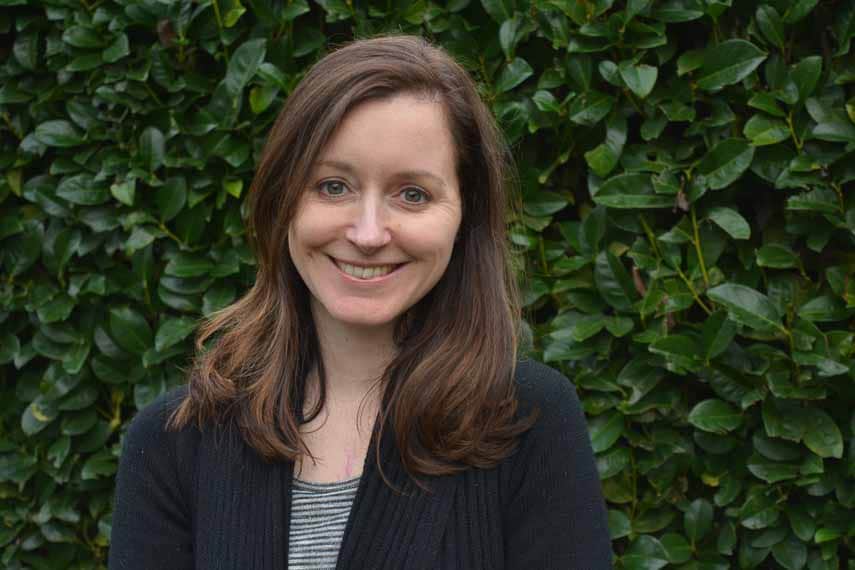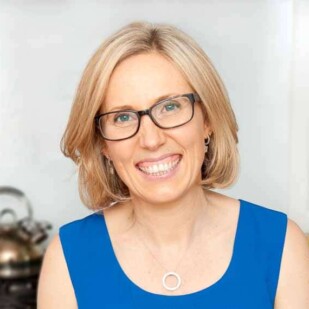Exclusive Chat with Kate Watson
Kate Watson RD lives in Washington State and she works with clients around the U.S. through phone consultations and video chats. Her interest in the low FODMAP diet originally stemmed from her own needs.

Kate herself had been suffering with debilitating IBS for years, so her experience with and interest in the diet is very personal. Kate was one of the early pioneers who recognized the potential of this diet and we wanted to bring her to you, as she is a dietitian you should know and she has an exciting at home program that is about to launch for those who are just starting the low FODMAP diet.
Dédé: Kate, thank you so much for chatting with us. You were an early adopter of this low FODMAP diet. Take us back and describe how you first came to learn about it.
Kate: Probably about 8 years ago I went to a GI doctor who was pretty progressive. I had been seeing her for my IBS, which I suffered with for over a decade at that point. I remember her writing down the words “Low FODMAP Diet” on a piece of paper. I went home and read about it online (keep in mind the information on it was way more limited than it is now), but I thought, “She must be crazy!
This diet restricts literally everything I eat.” So I avoided it and continued on in misery, trying other approaches for a few more years. I finally reached my breaking point, sadly, on my honeymoon in Mexico. I was quite sure that I had picked up a parasite and was ready to check myself into the hospital, but after eating nothing but rice cakes and dry cereal for a few days, I recovered and made it home.
Soon after I had some testing done and was told it was “just” my IBS and nothing serious. At that point, I vowed I would do whatever I had to do to get better. I remembered about that weirdly named low FODMAP diet my GI doctor had told me about years before and decided it was finally time to try it. And was I ever glad I did!
That is so funny that both you and I had the same moment where a doctor scribbled the FODMAP acronym on a piece of paper and both of our initial reactions was, WHAT? Was the diet an immediate game-changer for you personally? How about for your patients? About what percentage of patients do you see with IBS for whom the diet has been a key factor in their healing?
Yes, it was within a few days that I felt immediate changes, I felt like what a “normal” person must feel like. For my patients too, many of them feel improvements within a week, sometimes a little longer if they are more constipation predominant. I think diet is a key factor for most people with IBS, but it often is only a piece of the puzzle. We usually have to look at other factors too like stress management, which can be a big contributor to symptoms.
That’s why we have articles on yoga and that discuss, stress eating and stress reduction, too! What do you see your patients having the most difficulty with in terms of the diet?
I think they struggle with having to give up favorite foods for a period of time while doing the elimination and then challenge phase of the diet. The social isolation can be really difficult too.
Many of us don’t want to feel like “that difficult person” who asks for a bunch of dietary modifications at a restaurant or who has to opt out of eating a main dish at a family gathering or party.
Many people are not used to talking openly about the fact that they have digestive issues, and our society has a long way to go in terms of awareness and empathy for these health problems. So this can take people out of their comfort zone at first, but in the long run it’s also a growth opportunity
I love the article on your site titled “Low FODMAP at Starbucks”. It is this kind of practical approach to real life that we embrace here at FODMAP Everyday®. And speaking of practical, you have a “ New-to-FODMAPs Live Online Group Program ” starting on January 15th with a registration deadline of 1/8/2018. (UPDATE 11.2019 – this program is no longer available)
For less than $200 folks will be able to get personalized support from you during a 6-week period and we cannot think of a better way to start the year. Tell our readers all about it!
Thanks, my Starbucks article is definitely my most popular one! I’m so excited about my new program. The reason I designed it is because there are many people who don’t feel they can afford the services of a registered dietitian, even though it is recommended by Monash that people on this diet work with one.
There are also many people who have no access to a dietitian where they live, so with this program, they can do it from their own home and since the live sessions will be recorded, they can listen to it whenever is convenient for them. One thing I love about your site, Dédé, is that you understand that FODMAPs is a lifestyle and not just some fad diet.
Starting on the Low FODMAP diet is much more than giving someone a piece of paper of high and low lists. It’s a big change to how we live, and so my program will address the various aspects of the diet that a piece of paper just can’t do.
Kate, thank you for the compliments. We are working very hard at creating as supportive an atmosphere as possible and we were very excited to hear about your home program so that we could help publicize the opportunity.
You know, when people ask me about the diet I always say, just try it! Give yourself a week and you will know whether it is working for you. You have said you knew within 3 days and I did too. The best advice is just start! And support like this online course might just be what some folks have been looking for. They get to work with a dietitian, which we always recommend, and it can be in the comfort of their own home.
OK, I want to hear about how you came up with the idea for a low FODMAP bar. And as a recipe developer, I’d also love to hear about how you began tinkering in the kitchen to come up with the combination of ingredients.
I totally agree, just try it, there’s nothing to lose but everything to gain! As far as the protein bars, I admit we had no idea what we were getting into! But because I was so passionate about this diet and because at the time there were no low FODMAP food options on the market, I wanted to do something tangible to make this diet easier to follow.
I would go to the grocery store and sometimes cry out of frustration looking at food labels because there was literally nothing I could eat. I love cooking too but the reality is most of us don’t have time to cook every single thing from scratch. So our first idea was a protein bar because I felt that having a portable low FODMAP snack would make life so much easier for traveling, taking to work or for on-the-go lifestyles.
We started experimenting with recipes in the kitchen at home; though note to others, making food at home does not translate to food that you can sell commercially! Once we came up with a tentative formula that we liked and met the parameters of the diet, we went and worked with a food scientist to finalize the bar that went on the market.
You eventually sold your food startup to FODY Foods. You had the first low FODMAP prepared food; that is pretty forward thinking! Even though this was just a few years ago, the diet hadn’t gained as much traction as it has today. What convinced you and your husband that the time was right?
We did some market research and tried some preliminary ads to see what kind of interest there was in a low FODMAP bar. Because the feedback was positive, we decided to take the leap!
And you are right, the diet wasn’t nearly as well known as it is today so some of the challenge was getting the word out there about the diet. We did a lot of networking with physicians and dietitians to help us spread the word.
You had told us that you were dealing with some additional health issues at the time that you sold the company. Would you be willing to share with us more about your health journey?
I have valvular heart disease brought on by some childhood sickness, and I had to have my second open-heart surgery in April of 2016. I had debilitating endometriosis and adenomyosis, which forced me to have a hysterectomy. I suffer from migraines, fibromyalgia, and anxiety.
All that is to say that I know what it feels like to have an “invisible illness” and to be told by doctors (or have it implied) that your physical problems are “just in your head”. I have nothing but the deepest empathy for fellow IBS sufferers because it is one of the least acknowledged invisible illnesses, yet can be truly debilitating.
Ultimately, that’s why I made it part of my life’s purpose to help people who struggle with IBS, and I’ve found the low FODMAP diet is a cornerstone for a growing number.
Kate, these last words really touched me. I think about the times I was writing in pain (before the low FODMAP diet) and both doctors and lay people just didn’t seem to understand the severity of what I was experiencing. Thank you so much for your time and we are thrilled to be able to help your program gain a broader audience. It is programs like this that will make a huge difference for those still suffering, unnecessarily, with their IBS.
Thanks so much Dédé. I’m really excited to launch this new program and grateful to you and the team at FODMAP Everyday® for helping me spread awareness.







